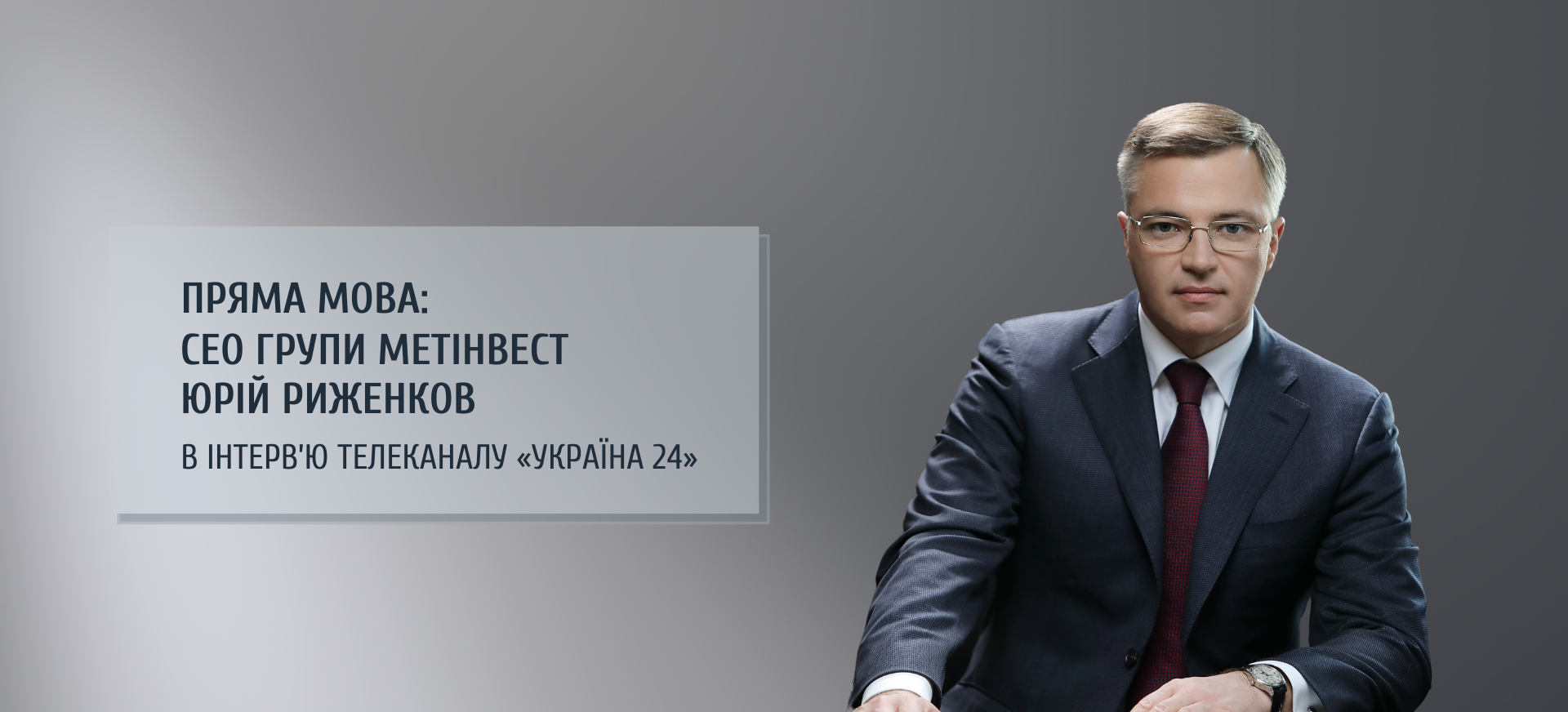Interview with Metinvest CEO Yuriy Ryzhenkov from march 29, 2022
Ukraine 24, represented by journalist Tigran Martirosyan, spoke with Metinvest Group CEO Yuriy Ryzhenkov on special broadcast. During the interview, the CEO talks about the situation in Mariupol and the work of the company's enterprises in the time of war. Metinvest's CEO predicted that Russia's economy would collapse due to the war in Ukraine, and explained why plants in Mariupol would never operate under occupation.
Find out more details in the video on the Youtube channel "Ukraine 24" or read the article:
- Could you believe that this would ever happen?
- Never. I still do not believe that this is really happening. A few months ago, we discussed projects for the reconstruction and decarbonization of production facilities in Mariupol... I can't wrap my head around this.
At the very beginning, when the war outbroke, we stopped the factories, opened bomb shelters for all the city residents and prepared a supply of water and food in advance. Now that the city is under siege, we sometimes get in touch with our staff. We know from them that the humanitarian situation in the city is getting worse by day, food and water are almost gone, the "green corridor" has never worked - every time it was disrupted by the Russian army. People leave the city at their own risk. What is happening now in Mariupol is a huge humanitarian tragedy.
- Have you managed to evacuate many of your employees?
- We have created a special hotline for them, through which they all, after leaving Mariupol, can contact us - so that we can help them and keep track of those who got out. As of today, 5,000 employees have registered through the hotline, which is a little more than 10% of the total number of our people who were in the city earlier this month.
- So the need for evacuation remains?
- Undoubtedly. After all, it is not only about those people for whom we have organized more than 6,000 accommodations in Zaporizhzhia, Kryvyi Rih, Kamianske, Pokrovsk, and who are already safe. But also about those who are in the so-called gray zone - our representatives also work there, we have opened summer boarding houses there, and we provide people with first aid, including psychological.
- Tell us about the humanitarian hub in Zaporizhzhia. What exactly is being done there?
- We have a two-tier system of assistance. There is a humanitarian hub, that we’ve opened on the basis of Metinvest Poland. Metinvest, together with DTEK and Rinat Akhmetov Foundation, buys and collects humanitarian aid provided by European countries. There it is accumulated and sent to Zaporizhzhia - to the humanitarian headquarters on the basis of Zaporizhstal, where it is sorted, packed in sets and sent to cities where we can deliver it. Of course, we try to help the cities that are under blockade first of all - we managed to deliver aid to Pologa, Energodar. We also managed to deliver aid to Berdyansk and distribute it there to refugees from Mariupol. This is how our headquarters work, and it is quite effective.
- Can you tell us what kind of the humanitarian cargo is coming from other countries? How much help do we get now from abroad?
- We have delivered 117 tons of basic necessities from Poland - long-term storage products, medical supplies, and another 300 tons are in route. More than 1,000 tons of aid have already been sent to people from the hub in Zaporizhia, where we sort not only European aid, but also everything bought in Ukraine.

- Enterprises in Mariupol and Zaporizhzhia are not working now, but what about others?
- We have almost full-scale operation of Kametstalʹ in Kamianske (80%), MPP (mining and processing plant) in Kryvyi Rih work at 35-40% and mainly concentrated on the supply to our European partners: they’ve made advances and almost doubled the number of orders for March. The Pokrovske mine management also works. And, of course, our companies work abroad.
- As far as I know, some of your enterprises have been repurposed to help the army?
- In fact, all our enterprises provide assistance to Ukraine. What's more, we ship metal so that our contractors and partners can also make anti-tank hedgehogs and chains at their plants. Since the beginning of the aggression, we have handed over to the Armed Forces more than 40,000 hedgehogs, more than 10,000 special anti-wheeled vehicles studded chains. We have also mastered the production of armor plates for bulletproof vests in our production facilities, and today we have provided more than 2,000 of them. These plates have already been made into bulletproof vests for the Armed Forces, the Territorial Defense and the National Police. We also deliver aid purchased abroad - mostly helmets, first aid kits, bulletproof vests.
- If we consider the territory that is being shelled and bombed, the key problem is logistics, or rather - the rupture of logistics chains. How do you cope with that?
- Absolutely correct. Ukrainian metallurgy was based on access to seaports. The main supply of metal went through the ports of Mariupol and the Black Sea, ore - through the Pivdenniy port and TIS. Unfortunately, many of these ports are now captured, many are on the verge of being captured, and routes from these ports are blocked. This has severely crippled our logistics. Now we are looking at the relaunch of the Zaporizhstal plant and realize: our main problem is how to import coal and how to export goods. We work very closely with Ukrzaliznytsia on these issues, because everything coincides here - both the company's and the country's interests. Our task is to find a solution to the logistics problem and restart Ukraine's economy.
- Undoubtedly, metallurgy is an export-oriented industry. I spoke with Finance Minister Marchenko, and he said that the government was also trying to resolve the supply of products via the western direction of the railway.
- Yes, the government is very involved in this matter, and we will find a solution. When the main logistics channel to Mariupol, which ran through Donetsk, was destroyed in 2014-2015, we were already working on solving a similar problem. By 2018, a solution was found and we were able to fully provide enterprises in Mariupol with raw materials. This time it will be the same: we will look at western crossings, look for innovative solutions, including container transportation. In short, we have many ideas. Of course, the implementation of some will take months, others will require years, but everything can be solved.
- Surely, we need to put the economy, as they say, on the military rails - and understand that it must work. How do you assess the consequences for the Ukrainian, Russian and world economies of this war? After all, Ukrainian and Russian iron ore will disappear from the world market for a long time.
- In terms of iron ore - there are two markets, European and Far Eastern (China, South Korea). From the European market standpoint, we remain one of the largest suppliers. Even in March, by the end of the month, we will have supplied almost a million tons of goods to our partners. If we talk about China - our and Russia's market shares there are so small that hardly anyone will notice.
As for us and the Russian Federation, the consequences will be more noticeable here, and first of all for the Russians - because they have lost the European market, and it is unclear whether they will be able to diversify. This entails a production drop of 30-40% for the country. In Ukraine, the decline is now about 60%. But we are looking for ways to reestablish export to European countries.
As for metal products, about 60% of Russia is domestic consumption, and the remains will be simply lost. The situation in Ukraine is worse. We see that Mariupol plants are not operational. I have no doubt that their work will be resumed, but for this to happen city must remain Ukrainian, and the Mariupol plants are more than a third of Ukraine's steel production. That is, as of today Ukraine has lost about 30-40% of its metallurgical capacity.
- This is a significant part of the economy. Is it possible for Metinvest Group companies to work under occupation at all?
- The position of our shareholder Rinat Akhmetov is unequivocal: he said that plants can work only in free, Ukrainian Mariupol. We have always, in all years, worked exclusively under Ukrainian law, in the Ukrainian legal field and tax system. In order for factories to work, there must be Ukrainian sovereignty.
- Were there any attempts to seize metallurgical plants in Mariupol?
- Currently there is an attempt to capture the city as a whole, and the factories comprise majority of the city. But, as far as I know, as of today, both plants, as well as the center of Mariupol, are under the control of the Ukrainian armed forces. I do not believe that Russia, even if it captures the city, will be able to launch these plants. For a number of reasons: first one - Russia has no market for these two giants, and their own production is being reduced. And the second one - qualified staff: no one will go and work at these enterprises, given the situation.
- Have you estimated approximately how much time it may take to revive the work of enterprises and life in Mariupol?
- Firstly, you need to assess the damage they’ve suffered. So far, judging by the fragmentary video, we can assume that there is no critical damage. Accordingly, the process of launching the plant is several months. The situation with the plants’ workers and their living conditions will be more complicated, because they will have to rebuild their homes. This will be more critical than starting plants. By the way, we are considering some ideas regarding this issue.
We were going to launch a cold-rolling mill in Mariupol - it was supposed to be the largest investment project in the history of Ukraine, about a billion dollars. Along with it we ordered the project of the whole container town with all the necessary sanitary and inhabited premises - which can be easily collected in any place, and it can function well. We are currently analyzing the issue of bringing this town to Ukraine as soon as possible: it can now be used for refugees. And when we return Mariupol and rebuild it, workers who will restore it will be able to live there.
By the way, I can give interesting statistics on the timing of Azovstal's recovery. When the Germans attacked during World War II, the factories were completely destroyed, mined and blown up. After that, the first steel was produced on Ilyich in a year and eight months, and two years later on Azovstal. It was complete destruction. On the other hand, the Donetsk metallurgical plant started working five months after its liberation.
- How did the war and the shutdown of factories in Mariupol affect your enterprises abroad?
- Firstly, all employees of our companies are involved in the organization of humanitarian aid. We accommodate refugees in Italy, Britain, Bulgaria, collect humanitarian aid and deliver it to Ukraine. And in terms of work - the most difficult situation will be in our British and Italian plants, because they were completely dependent on the slabs that were supplied from Azovstal. This creates a severe situation on the market, but we are working to solve this issue. This is also a serious shock to European industry, as they were working on slabs from Azovstal and Russian plants. Today both suppliers have disappeared from the market.
- I can't help but ask: what future awaits Metinvest Polytechnic now?
- To date, the project is not closed. We are trying to keep the staff: most of them have been evacuated and continue to work on curricula. It is important to understand that the Polytechnic is not a fancy building and scientific laboratories, that we have already ordered. These are, first of all, people, the teaching staff, whom we gathered from scratch. And it is quite difficult, since many teachers left the country because there was no demand for these specialties. This is the base that we were able to preserve.
- Training, if I remember correctly, should begin in September?
- That's what we had in mind. However, most likely, we will not be able to recruit the first course - unless the war ends tonight, and Mariupol will be completely liberated. But we will continue our in-service training courses.
- Are you in Ukraine? In Kyiv?
- Not in Kyiv itself. I am in the Kyiv region now, but yes, I am in Ukraine. This is a fundamental question for our shareholders, who are currently also here, and all of management: at this time we are with the country. And we are working towards our victory. Rinat Akhmetov said directly: after the victory he will focus all his investments on the reconstruction of Ukraine and Mariupol. It will become better than ever before.




